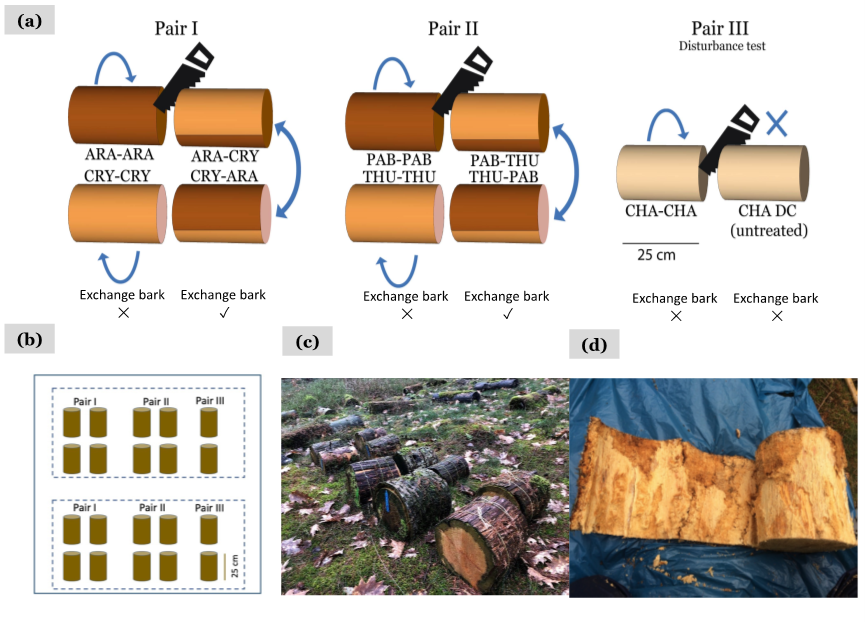2023 HARPER PRIZE SHORTLIST: Throughout March, we are featuring the articles shortlisted for the 2023 Harper Prize. The Harper Prize is an annual award for the best early career research paper published in Journal of Ecology. Chenhui Chang’s article ‘Reciprocal bark exchange helps to disentangle tree species-dependent bark and wood trait effects on invertebrate diversity‘ is one of those shortlisted for the award:
👋 About me
I grew up in the countryside of Hebei Province in the north of China. I started my college life in the rainy city of Yaan, which is located in the southeastern part of China. Every time I travelled from my hometown to college, from the temperate region to the subtropical region, I was always amazed by the contrasting images of nature. When I got on the train, the city and people were still covered with white snow, shining in the sun. Ten hours later, the white color faded, with yellow rape flowers blossoming, then yellow all over the mountains and plains. I am proud to say that I have experienced travelling from winter to spring within two days! I had no idea that there are so many kinds of tree species, with different shapes and colors of leaves and flowers. From this curiosity, I majored in forest ecology and got my PhD still focusing on the forest ecosystem. Now I am still working on forest ecology, especially the afterlife effects of dead trees in subalpine forests on the eastern Qinghai-Tibetan Plateau.
🔎 About the shortlisted paper
The shortlisted paper reported one of the works done in the LOGLIFE project (see also Cornelissen et al. 2012 in Ambio for details), which was established in 2012, aiming to disentangle the decomposition dynamics of deadwood and associated biodiversity (Fig.1). In total 25 temperate tree species were incubated in two extremes of decomposition environments in the Netherlands, i.e. a site with poor and acidic sandy soil (Schovenhorst) and a site with rich, basic-rich clayey soil (Flevoland). In this paper, we focused on the effects of bark traits versus wood(xylem) traits on the invertebrate community composition.
To unravel whether and how the tree species-specific bark traits versus wood traits influence invertebrate assemblage at mid-decay stage, the shortlisted paper presents a reciprocal bark transplantation within pairs of different tree species as a new method. We applied this method to two pairs of phylogenetically contrasting species of gymnosperms (pair I: ARA- CRY Araucaria araucana and Cryptomeria japonica, pair II: PAB-THU Picea abies and Thuja plicata) and another gymnosperm (CHA Chamaecyparis lawsoniana) set as disturbance control to test for potential bark manipulation artefacts on invertebrate community composition (Fig.2).
Our bark exchange experiment revealed that both bark and wood host abundant and divergent subsets of invertebrates on mid-decay logs of different tree species. We further documented that the invertebrate community composition was predominantly shaped by the traits of host tissue per se, while also being significantly but less strongly affected by the traits of the other tissue, i.e. the adjacent bark or wood. Our results indicated that bark traits effects faded with time and how long bark traits effects persist greatly depends on bark thickness. Combined with bark removal methodology, our bark exchange method can be further extended to more decay stages and more forest biomes to track bark trait effects and bark induced priority effects on deadwood decomposition, and its associated invertebrate and microbial communities.
🌳 What’s next?
In 2026, the LOGLIFE project will have its final harvest. We will collect all the vegetation and invertebrates growing or living in the deadwood, and measure the mass loss of deadwood. We are also interested in the contribution of deadwood of different tree species to the structure and composition of soil organic matter. The soils underlying decaying deadwood and nearby will be collected for analysis.
Deadwood is vital to the stability of forest ecosystems in cool and cold regions, for instance by reducing soil erosion, buffering the humidity fluctuation during dry periods for organisms, and regulating sediment transport and storage. I will start a series of deadwood decomposition experiments to study these issues, in subalpine forest on the eastern Qinghai-Tibetan Plateau, China. Diverse kinds of collaborations are all warmly welcomed, please contact me if you are interested.
Find Chenhui on X and GoogleScholar.
Read the full list of articles shortlisted for the 2023 Harper Prize here.


